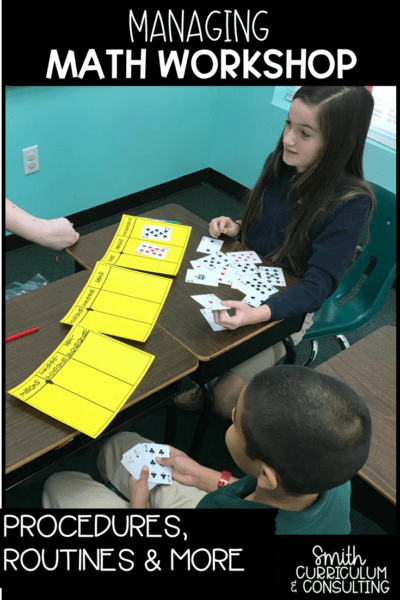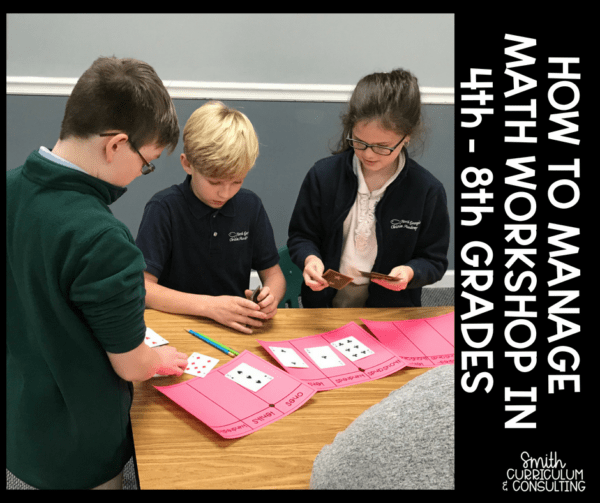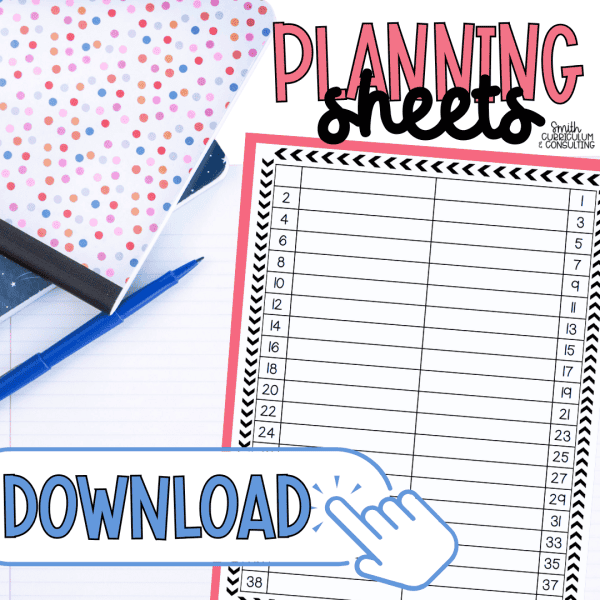 Classroom management can make or break us as a teacher. When implementing a new system of learning, it is important that we take time to create our management system as well. Managing Math Workshop doesn’t have to be hard and with these 4 clear steps I hope that you can see it can be done… yes, even with 7th and 8th graders. I promise!
Classroom management can make or break us as a teacher. When implementing a new system of learning, it is important that we take time to create our management system as well. Managing Math Workshop doesn’t have to be hard and with these 4 clear steps I hope that you can see it can be done… yes, even with 7th and 8th graders. I promise!
Make Conscious Decisions
One of the main components of making Math Workshop consistently work well is to take time to implement clear procedures and routines for your class. Develop a consistent schedule that students come to know and trust, develop clear expectations of what the roles of the students and the teacher are, develop guidelines on what Math Workshop looks like and sounds like… create a visual and make it clear for all students regularly.
I’m not saying that this will all be easy but I’m saying that the more that you front-load with having your procedures and routines in place, the easier your job will be in managing the students during math workshop while you are working with small groups or even holding math conferences. Making decisions ahead of time on various different aspects will help your entire math workshop block run smoother.
Management starts with choosing how your students will work within their math workshop block. Will they be in a rotation system or will they be using a Self-Selected System such as choice boards. Each of these systems have their benefits and only you know which one will work best with your students, your teaching style and your classroom resources.
Ask yourself the following questions:
-
- How will students get the materials from where they are stored?
- How will other group members move to the location to work?
- If students don’t understand a task, what should they do?
- What voice levels should students use?
- What do students do if materials aren’t available?
- What should students do if technology isn’t working?
- What should students do if they have questions?
- What should students do if they finish early?
- How will you signal students to rotate/clean up?
- How will students turn in their work?
While all of our classrooms, students and teaching styles are different we all want what is best for our students and these questions can help.
Don’t Be Afraid to Change When Something Doesn’t Work

There are times in our classroom where no matter how much we have planned, practice, and prepared for something, things just don’t go the way that we have planned. Guess what… this is perfectly fine!
We can’t be afraid of change, we must embrace it. If the way that you originally planned for Math Workshop to be set up isn’t working for your students change it. I’m giving you permission, no, I’m telling you to for your sanity.
Our students from year to year (heck, class to class) have different needs and we have to embrace those. We have to be flexible and allow change to happen so that we can all grow together. If you aren’t sure what might work for you or your students, reach out to colleagues, friends, or join my Facebook Group for Surviving Sixth, Seventh and Eighth Grade Math (for Teachers).
Practice, Practice and More Practice
When you are implementing anything new in your classroom we all know the best practice is to practice, practice and practice some more. Taking that time to do all of that tedious practice will pay off in the end because your students will know exactly what is expected of them.
During the first two weeks of Math Workshop, don’t pull small groups. Use this time to monitor, establish non-verbal cues, design an effective workflow and review the rotations and expectations for your students. Know that during this time you may have to pause the actual workstations and address any issues and this is okay. Take this time to train your students in what you expect to happen even if you weren’t in the classroom to make it happen. You will thank me later by making sure to take this time to practice.
Things to make sure to practice:
-
- Transitions from whole group to stations and from station to station. Establish a signal and use it. I use a simple electric doorbell.
- Hand signals you might want to use for questions, bathroom, etc.
- Obtaining materials and putting them away when finished
- Seeking out information from available resources (Math Workshop Rotation board, Math Workshop sheets, peers, etc.)
- What to do in case of an interruption (fire drill, announcements, guest coming in the room, etc.)
Monitor Before Implementing Small Groups
 While you are monitoring your small groups during those first two weeks, don’t be afraid to provide constructive feedback that is open-ended so students can quickly and easily determine how to correct their behaviors. When we turn it around and let them tell us what the expectations are it helps them to process it because not only are they thinking about it, they are saying it aloud and then those that are in their group will also hold them accountable.
While you are monitoring your small groups during those first two weeks, don’t be afraid to provide constructive feedback that is open-ended so students can quickly and easily determine how to correct their behaviors. When we turn it around and let them tell us what the expectations are it helps them to process it because not only are they thinking about it, they are saying it aloud and then those that are in their group will also hold them accountable.
Another important thing to do is to go overboard with the positive reinforcement. Is one of your students modeling exactly what you expect from them during Math Workshop? Take time to recognize and offer verbal praise as other members of their group will catch on. Looking for these model students (who I like to call my Structure Sergeants) will not only help other students but they will also help you in the long-run as you can rely on them to help make sure their group is on track.
Once you have started small groups, still look for these students to give positive reinforcement to and recognize them either during whole group time with your class or on a note passed to them. They will appreciate being recognized and you will build the positive reinforcement in your classroom for more students to stay on track.
How does management affect you in your classroom? Are there any specific struggles you can see facing in your classroom?
Are you ready to dig in and learn all there is to know about Math Workshop in one concise place? Grab my Math Workshop eBook today that includes 42 pages of of all the information you need to get started as well as over 20 EDITABLE templates to keep you organized and on your toes with planning and documentation throughout the year!
Teach Me About Math Workshop!
Looking for all the latest about using Math Workshop in the Middle Grades? Join today and grab the FREE Editable Math Workshop Sheets and all of the great emails to come your way!
Success! Now check your email to confirm your subscription.





